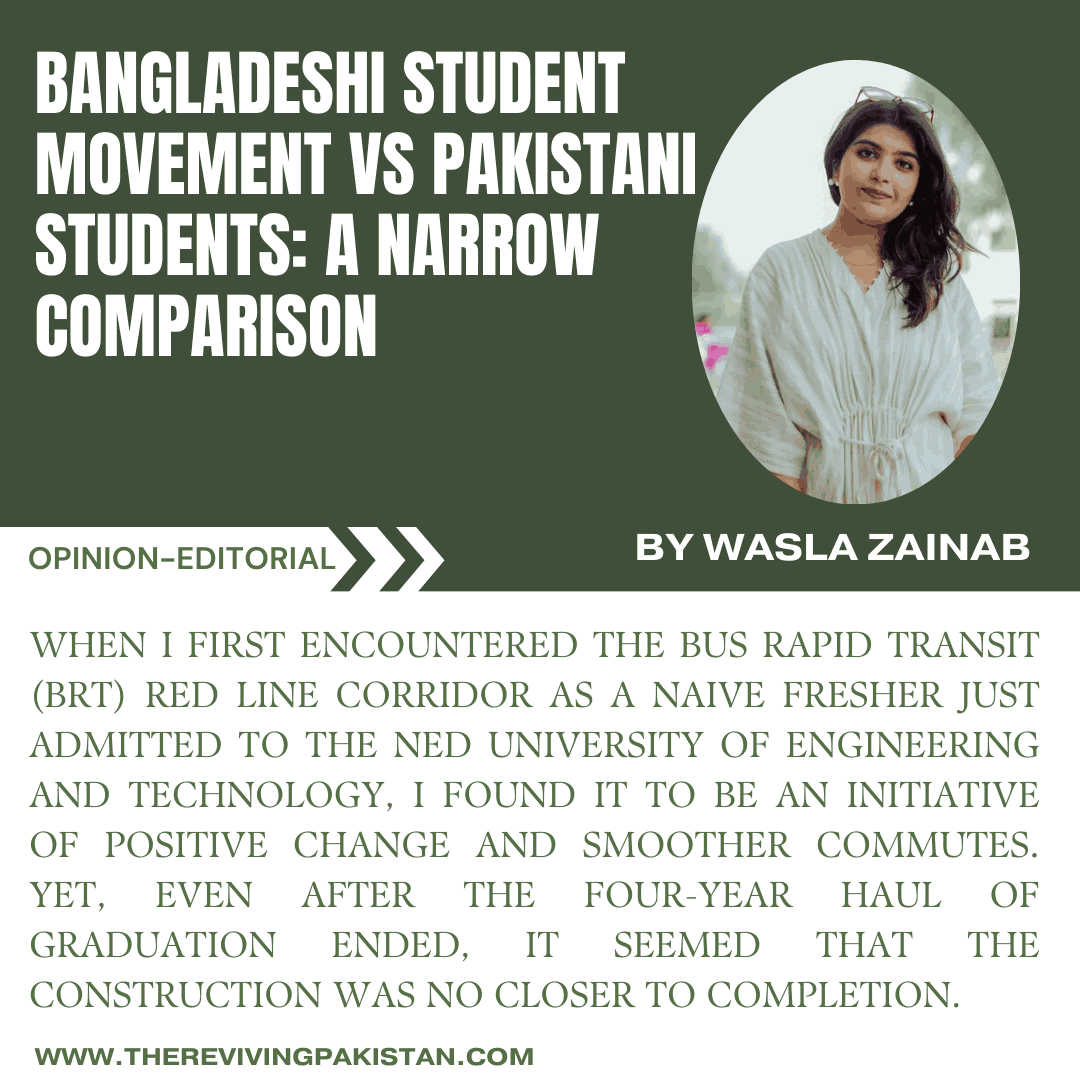About the Author(s)

Wasla Zainab Awan
The author is a full-time Telecommunications Engineer and part-time writer with a fondness for socio-political affairs and fictional content creation. When not crafting stories, you can find her with a laptop, a hot cup of tea, and some cybersecurity insights.
When I first encountered the Bus Rapid Transit (BRT) Red Line corridor as a naive fresher just admitted to the NED University of Engineering and Technology, I found it to be an initiative of positive change and smoother commutes. Yet, even after the four-year haul of graduation ended, it seemed that the construction was no closer to completion. At times, the ongoing construction project, which frequently disrupted commuting along the route, along with incidents of theft right in front of the university gate, left me feeling neglected and unsupported by the city’s authorities with no one to take charge and responsibility.
This specific case made me highlight a broader issue affecting Pakistani society today. Rising inflation, political instability, and inadequate governance facing our cities contribute to a sense of collective frustration. However, the recent proceedings of the Bangladesh reform movement had me in awe of the courage of the Bangladeshi students who spearheaded an entire movement against the government for their rights.
I can’t help but wonder how we as a nation could have been a force in ourselves if there had been a strong and active student union advocating for our cause. Imagine if such an organization had been actively raising its voice against the endless issues of the country, demanding accountability and tangible action from local authorities.
Turning back the pages of history, it was forty years ago when General Zia-Ul-Haq banned student unions in Pakistan. Since then, educational institutions, government officials, and stakeholders never really tried to revive the culture of students taking a democratic lead.
While the downfall of Haseena Wajid in Bangladesh is hailed as a historic victory for Bengali youth, comparing the youth of Bangladesh and Pakistan highlights several key factors.
1. Political Support.
Bangladesh: Student unions in Bangladesh have often been affiliated with major political parties. This affiliation provides them with substantial political backing and resources, amplifying their voice in national politics.
Pakistan: In Pakistan, student unions have faced intermittent bans and restrictions, which have hindered their ability to engage effectively with political parties and the government. The political environment has often been less supportive of student activism.
2. Public and Media Attention.
Bangladesh: Student unions in Bangladesh often receive considerable media attention for their activities and campaigns. This visibility helps spread their voices and brings their issues to the forefront of public discourse.
Pakistan: Media coverage of student union activities in Pakistan can be inconsistent. This lack of visibility sometimes diminishes their ability to influence public opinion and government policy.
3. Social Challenges.
Bangladesh: Bangladeshi students actively participate in national movements, protests, and campaigns, which strengthens their role in shaping public policies and social issues.
Pakistan: Students in Pakistan suffer political restrictions and social challenges. The level of civic engagement among students varies, affecting their collective impact.
Summarizing it all, the strength and influence of Bangladeshi student unions, fuelled by their political affiliations and media presence, highlight what could be possible if Pakistani students had similar support. The absence of a strengthened student union culture in Pakistan since General Zia-Ul-Haq’s ban has deprived the nation of a potential driving force for democratic change and accountability.
As we reflect on these differences, it becomes evident that a revival of active student unions in Pakistan could play a crucial role in addressing national issues, advocating for necessary reforms, and fostering a more engaged and empowered youth. The lessons from Bangladesh’s student movements offer valuable insights into the transformative potential of organized student advocacy and the impact it can have on shaping a nation’s future. Let us hope for a Pakistan that shines brighter with its youth and students taking up the front and working for the country’s betterment.

